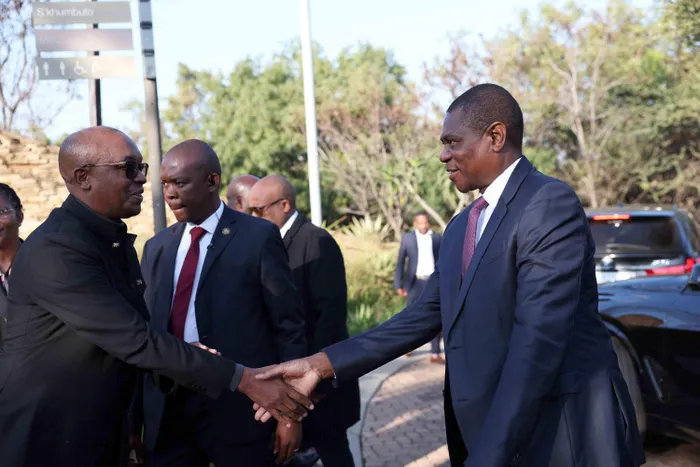Mashatile proposes war rooms to tackle economic challenges in South Africa
ECONOMY

Deputy President Paul Mashatile arrives at the Freedom Park Heritage Site and Museum in Pretoria, ahead of his participation in a Business Breakfast engagement session on the Transformation Fund, which is a key initiative aimed at accelerating transformation and supporting black-owned and black-managed businesses across various sectors in South Africa.
Image: GCIS
Banele Ginindza
Deputy President Paul Mashatile has proposed the establishment of three dedicated war rooms focusing on pivotal areas: the economy and jobs, poverty and hunger, and clean governance.
Speaking at a business breakfast session and launch of the Transformation Fund at Freedom Park Heritage Site and Museum in Pretoria, Mashatile on Monday said the country currently faced one of the highest levels of economic inequality globally, with a Gini co-efficient of 0.63 and a poverty rate of 17.82% highlighting the significant disparity in income and wealth.
"The war rooms will not follow the normal Cabinet process but instead, they will take a deliverology approach, which is the discipline of getting things done. We will do stock takes, deep dives, and intervene decisively where there is no progress," Mashatile said.
He said the private sector participation in each war room would be more than about mere representation but about accomplishing and obtaining results.
"The war rooms must meet regularly to track the work being done and report to the larger war room, which I will convene and report to the President," Mashatile said.
He said the government will be hosting the National Dialogue as part of forging an inclusive development future and as an opportunity to establish a social compact with the public for the implementation of the Medium-Term Development Plan.
"The Dialogue will provide an opportunity to secure stakeholder commitments for collaboration with the government to achieve common goals. Therefore, as we meet today, let us identify targets and commitments that we must track as we approach the convening of this important Dialogue," he said.
Mashatile said that as things stand, the government might not be in a position to meet all the NDP's 2030 targets, which calls for a focus shift and a modelling exercise, similar to the one that was done by the Gauteng Provincial Government in developing GGT2030.
He said as enterprises sought improved access to capital and the need to remain competitive, the Transformation Fund would be invaluable to unleash Enterprise and Supplier Development's (ESD) potency in driving economic inclusion and participation.
"We are going to make sure that the Transformation Fund is at the centre of government, specifically the Presidency. We will work with the Minister of Trade and Industry, as well as the key economic cluster ministers to ensure that we meet the set targets, especially in the procurement of goods and services," Mashatile said.
He said this will include expanding spending aimed at supporting African and black enterprises in townships and rural South Africa led by women, youth, and people with disabilities.
The National Treasury and the Department of Women, Youth, and People with Disabilities have already collaborated to develop such a framework. The focus is to ensure speed of execution and equally implement the Preferential Procurement Policy Framework Act.
Mashatile said it was important to recognise that the funding deficits in South Africa were a contributing factor to the failure of small businesses, in spite of government intervention such as ESD, adding that there was still a need for additional measures to be taken to expand fund access to SMMEs.
"Loans are the most common financial instrument for micro, small, and medium-sized enterprises in South Africa, but they often have stringent underwriting standards, making them difficult for smaller businesses with limited collateral and financial records to secure," he said.
BUSINESS REPORT